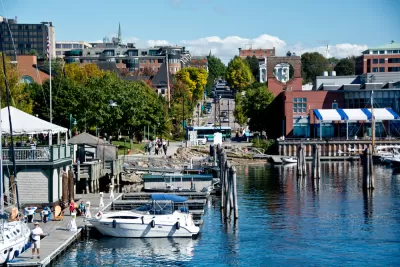The city of Burlington, largest in the Green Mountain State, is the only city in the U.S. to provide electricity from entirely renewable sources, notwithstanding criticism from some environmentalists. PBS Newshour Weekend investigates.

Burlington, population 42,000, "recently announced that it now produces or gets more power than its citizens use," states William Brangham, producer, cameraman and correspondent for PBS NewsHour Weekend. "And it’s all coming from renewable sources of energy like wind and solar and hydroelectric."
Taylor Ricketts, professor of Environmental Science at the University of Vermont, "says Burlington has shown that cities can play a role in addressing our dependence on burning fossil fuels, which is the principal driver of climate change," states Brangham.
"(T)here’s no silver bullet to fix climate change," states Ricketts. "It’s gonna be a million individual solutions from all over the place."
Ken Nolan of Burlington Electric, the local utility company, states that their financial analysis revealed "that the cheapest, long term financial investment for us with the least amount of risk was to move (toward 100 percent renewables.)"
Nolan says that switching from fossil fuel energy to renewable energy will likely save the city about $20 million dollars over the next two decades. What’s more, Burlington’s (electric) rates haven’t increased since 2009.
So, what's their secret sauce? Below text refers to accompanying video:
- One third biomass: burning "scrap wood from across Vermont, use the heat to make steam, and thus generate electricity." Brangham indicates that the smoke being emitted is water vapor.
- "Another 20% or so is sourced from wind turbines like these on the hills of a neighboring town,
- "and solar arrays like this one at the airport add another small amount to their total.
- "But the biggest portion of the city’s renewable production comes from hydropower… some they source from other places, like this older hydroelectric dam in Maine, some they produce at their own plant on the Winooski river [sic]."
It's the older hydropower that Sandra Levine, senior attorney at New England's Conservation Law Foundation, objects to, claiming that the old Maine hydro plant "shouldn't be considered as green as brand new, wind and solar facilities."
Others in the environmental community, such as EcoWatch, Inside Climate News and the Natural Resources Defense Council would likely point to the biomass plant. All three sources write about the release of an April, 2014 study by the Partnership for Policy Integrity claiming that biomass plants can be more polluting than coal plants.
However, biomass plants are classified as producing renewable power by the Department of Energy.
According to the Energy Information Administration (EIA), 53% of all renewable energy consumed in the United States was biomass-based in 2007
In summary, according to Professor Ricketts, any city can replicate Burlington's path to transitioning to relying on 100 percent renewables. "It was just a bunch of decisions made over ten years or more, to get towards renewable energy," he states.
FULL STORY: Running on renewable energy, Burlington, Vermont powers green movement forward

Trump Administration Could Effectively End Housing Voucher Program
Federal officials are eyeing major cuts to the Section 8 program that helps millions of low-income households pay rent.

Planetizen Federal Action Tracker
A weekly monitor of how Trump’s orders and actions are impacting planners and planning in America.

The 120 Year Old Tiny Home Villages That Sheltered San Francisco’s Earthquake Refugees
More than a century ago, San Francisco mobilized to house thousands of residents displaced by the 1906 earthquake. Could their strategy offer a model for the present?

HSR Reaches Key Settlement in Northern California City
The state’s high-speed rail authority reached an agreement with Millbrae, a key city on the train’s proposed route to San Francisco.

Washington State Legislature Passes Parking Reform Bill
A bill that would limit parking requirements for new developments is headed to the governor’s desk.

Missouri Law Would Ban Protections for Housing Voucher Users
A state law seeks to overturn source-of-income discrimination bans passed by several Missouri cities.
Urban Design for Planners 1: Software Tools
This six-course series explores essential urban design concepts using open source software and equips planners with the tools they need to participate fully in the urban design process.
Planning for Universal Design
Learn the tools for implementing Universal Design in planning regulations.
Ada County Highway District
Clanton & Associates, Inc.
Jessamine County Fiscal Court
Institute for Housing and Urban Development Studies (IHS)
City of Grandview
Harvard GSD Executive Education
Toledo-Lucas County Plan Commissions
Salt Lake City
NYU Wagner Graduate School of Public Service





























